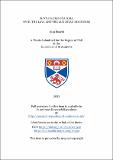Files in this item
Sunt superis sua iura. Ovid, the law, and the Augustan discourse
Item metadata
| dc.contributor.advisor | Buckley, Emma | |
| dc.contributor.advisor | Manioti, Nikoletta | |
| dc.contributor.author | Eusebi, Sara | |
| dc.coverage.spatial | 222 | en_US |
| dc.date.accessioned | 2023-07-10T15:26:02Z | |
| dc.date.available | 2023-07-10T15:26:02Z | |
| dc.date.issued | 2023-11-29 | |
| dc.identifier.uri | https://hdl.handle.net/10023/27930 | |
| dc.description.abstract | My thesis investigates how Ovid’s treatment of juridical language and content fits into the socio-cultural landscape of Augustan Rome. Moving beyond the legacy of his early career in the forum, Ovid resorts to the legal to express a wider engagement with divine and political justice – an aspect of consistency and evolution throughout the poet’s corpus. In the Amores, the Ars Amatoria and the Heroides, Ovid revisits the elegiac code to formulate an extended recusatio that plays with the ‘micro-semantics’ of the legal to bring to the fore the gaps in the narrative of Augustus’ legislation. Through a selection of legally-inflected case studies, I demonstrate that the Metamorphoses shares the same approach to ius as his elegiac poetry, though developed through a more in-depth exploration of power dynamics, as arbitrary divine jurisdiction in the mythological universe of the poem mirrors the ‘state of exception’ of the Princeps iudex. In the Fasti, Augustus’ appropriation of legal calendar time highlights the convergence of the Princeps’ and the poet’s fictional procedures: myth and traditional legacies are deceptively ‘recodified’ through Ovid’s ‘mythologising’ ius in a similar fashion to Augustus’ reimagining Rome’s constitutional system through fictio iuris, as both the poet and the Princeps adapt the notion of justice to their respective agendas. In his elegy Ovid engages with the tension created by Augustus’ new role as lawgiver, an approach that evolves when taking the Metamorphoses’ history of the universe into account, to then show a further change through the prism of the Fasti, as the same power dynamics are matched with the Princeps’ narrative of control. The ‘micro-semantics’ of ius are thus reconciled with the macro-semantics of Ovid’s reflections on the nature of justice, becoming the playing field for the poet’s deceptive narrative devices to mirror the fictional nature of Augustus’ regime. | en_US |
| dc.description.sponsorship | “I would also like to thank the Classical Association for funding my stay at the Fondation Hardt in July 2022.”--Acknowledgements | en |
| dc.language.iso | en | en_US |
| dc.subject | Ovid | en_US |
| dc.subject | Augustus | en_US |
| dc.subject | Augustan poetry | en_US |
| dc.subject | Fictio iuris | en_US |
| dc.subject | Ius | en_US |
| dc.subject | Lex | en_US |
| dc.subject | State of exception | en_US |
| dc.subject | Roman law | en_US |
| dc.subject | Augustan principate | en_US |
| dc.subject | Recusatio | en_US |
| dc.subject | Metamorphoses | en_US |
| dc.subject | Fasti | en_US |
| dc.subject | Ars amatoria | en_US |
| dc.subject | Heroides | en_US |
| dc.subject | Amores | en_US |
| dc.subject | Tristia | en_US |
| dc.subject | Epistulae ex Ponto | en_US |
| dc.subject | Princeps | en_US |
| dc.title | Sunt superis sua iura. Ovid, the law, and the Augustan discourse | en_US |
| dc.type | Thesis | en_US |
| dc.contributor.sponsor | University of St Andrews. School of Classics | en_US |
| dc.type.qualificationlevel | Doctoral | en_US |
| dc.type.qualificationname | PhD Doctor of Philosophy | en_US |
| dc.publisher.institution | The University of St Andrews | en_US |
| dc.identifier.doi | https://doi.org/10.17630/sta/542 |
This item appears in the following Collection(s)
Items in the St Andrews Research Repository are protected by copyright, with all rights reserved, unless otherwise indicated.

